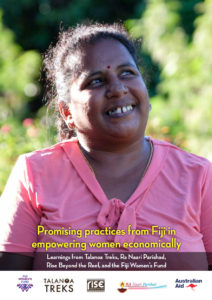Promising practices from Fiji in empowering women economically
October 18, 2019
[cmsmasters_row data_shortcode_id=”7il45sh9u8″ data_width=”boxed” data_padding_left=”3″ data_padding_right=”3″ data_top_style=”default” data_bot_style=”default” data_color=”default” data_bg_position=”top center” data_bg_repeat=”no-repeat” data_bg_attachment=”scroll” data_bg_size=”cover” data_bg_parallax_ratio=”0.5″ data_padding_top=”0″ data_padding_bottom=”50″ data_padding_top_laptop=”0″ data_padding_bottom_laptop=”0″ data_padding_top_tablet=”0″ data_padding_bottom_tablet=”0″ data_padding_top_mobile_h=”0″ data_padding_bottom_mobile_h=”0″ data_padding_top_mobile_v=”0″ data_padding_bottom_mobile_v=”0″][cmsmasters_column data_width=”1/2″][cmsmasters_text shortcode_id=”ua3t7c8zkk” animation_delay=”0″]

[/cmsmasters_text][/cmsmasters_column][cmsmasters_column data_width=”1/2″][cmsmasters_text shortcode_id=”ec18grj46″ animation_delay=”0″]
This paper is jointly authored by eight women who work with the Fiji Women’s Fund and three of the Fund’s partner organisations – Talanoa Treks, Ra Naari Parishad, and, Rise Beyond the Reef. The paper aims to contribute to improved women’s economic empowerment programs by sharing the experiences of these three partners. The authors document the learnings of practitioners in Fiji and compare these with the existing literature for the audience of practitioners in the Pacific and abroad. The Fiji Women’s Fund supports the documentation of research from practice, so that the expertise of practitioners is recognised, and, to increase the body of knowledge generated from the Global South.
The paper examines the experiences and learnings of the three partners using the Gender at Work framework, developed by Rao and Kelleher, which highlights the inter-linked dimensions of change required to achieve sustainable progress on gender equality and women’s empowerment. The paper documents the similar journey taken by all three partner organisations, through each of the four quadrants of this framework. All three entities supported the establishment of a formal, collective structure being established, to provide women access to training and income-generating opportunities. Women accessed these opportunities to improve their skills, capabilities, income and assets. These changes, in turn, had an influence on the way the women themselves, and the men in their lives, think about what it means to be a woman or a man and the possibilities available. For example, there is evidence of positive changes to what women and men are doing in their households. Husbands, sons and partners are helping women beneficiaries by taking on some of the care tasks that were previously left to the women. The greatest evidence of change is within households, as changes to exclusionary practices at the village level are less evident.
[/cmsmasters_text][cmsmasters_button shortcode_id=”bu661wlo28″ button_type=”regular” button_link=”/wp-content/uploads/2019/10/WEE-report-for-web.pdf” button_target=”blank” button_text_align=”left” button_font_weight=”normal” button_font_style=”normal” button_icon=”cmsmasters-icon-download-1″ button_border_style=”solid” animation_delay=”0″]Download this publication now (PDF)[/cmsmasters_button][/cmsmasters_column][/cmsmasters_row]
Recent Whats New
Resilience and Sustainability in Action
October 28 2025
Nalini Singh Calls for Collective Feminist Resilience
October 28 2025
